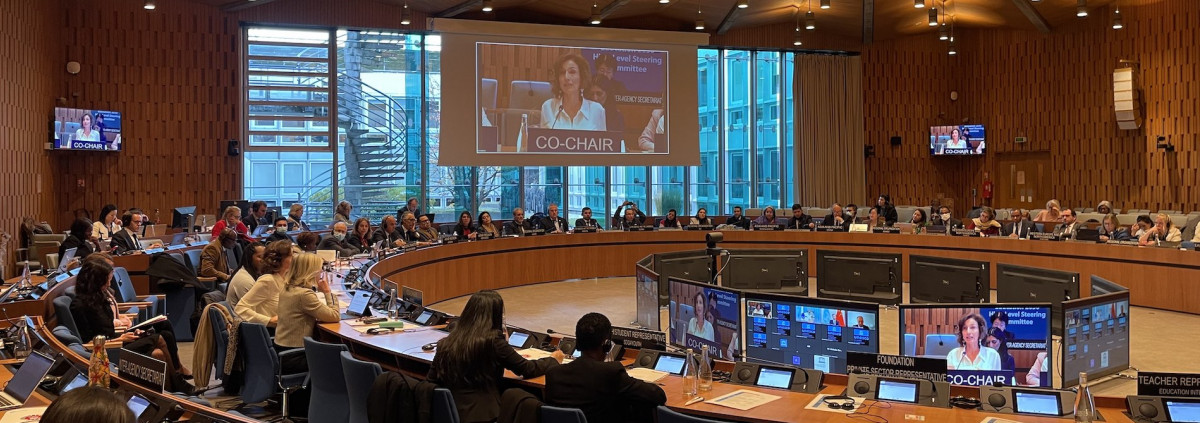The High-Level Steering Committee on Sustainable Development Goal 4 on education, convened by UNESCO, called on countries to adopt new indicators measuring the implementation of green education and digital access to learning for all.
9 December 2022
To advance these priorities, on Thursday 8 and Friday 9 December UNESCO convened a meeting of the High-Level Steering Committee on Sustainable Development Goal 4 on education. The meeting was held at UNESCO Headquarters, under the chairmanship of Audrey Azoulay, UNESCO’s Director General, and Julius Maada Bio, the President of Sierra Leone.
Following the Transforming Education Summit (TES) that took place on September 2022 in New York, the UN Secretary General mandated the Committee to ensure and monitor the effective follow-up of the commitments of countries made at the Summit.
The Committee called on world leaders to endorse the six calls to action made at the Summit: the green and digital transitions, advancing gender equality, foundational learning, education in crisis contexts, and equitable and efficient education financing.
|
“Ensuring that all children and youth are climate ready, improving schools’ digital connectivity and students’ access to online learning contents are critical goals. We appeal to world leaders to accelerate progress in these areas, according to the agreements reached at the Transforming Education Summit,” said Audrey Azoulay, Director-General of UNESCO. |
Ensuring that the calls to action are translated into concrete plans, it created new indicators measuring green and digital education at the national level, and called on countries to build on the Sustainable Development Goal benchmarking process by setting national targets for both.
These benchmarks will measure the progress that each country intends to achieve by 2025 and 2030, representing the transformation countries want to see resulting from the Summit. Countries could measure how many schools are green-accredited, and the extent to which national laws, policies and standards cover climate education. On digital transformation, countries could measure the extent to which every school and child is connected to digital solutions.
More about the High-Level Steering Committee (HLSC)
The HLSC is composed of principals of United Nations and education partner agencies, civil society and donor representatives, and Ministers of Education from the 12 countries representing their respective regions: Argentina, Bangladesh, China, Colombia, Côte d’Ivoire, France, Jordan, Latvia, Morocco, Portugal, Sierra Leone and Slovenia, and aims to speed country-level progress towards Sustainable Development Goal 4 for quality education for all by 2030.
More about the Transforming Education Summit (TES)
The TES, the largest global education summit in recent decades, led to national commitments from 133 countries to recover learning losses from the pandemic and transform their education systems to make them more inclusive, relevant and resilient to future shocks.
***
For media enquiries or to arrange interviews, please contact: Clare O’Hagan, Press Officer, UNESCO, c.o-hagan@unesco.org
Read more:
SDG 4 benchmarking process: https://unesdoc.unesco.org/ark:/48223/pf0000382076
